Oubliette by Wapole Languray
§1 Awakening
Original SA post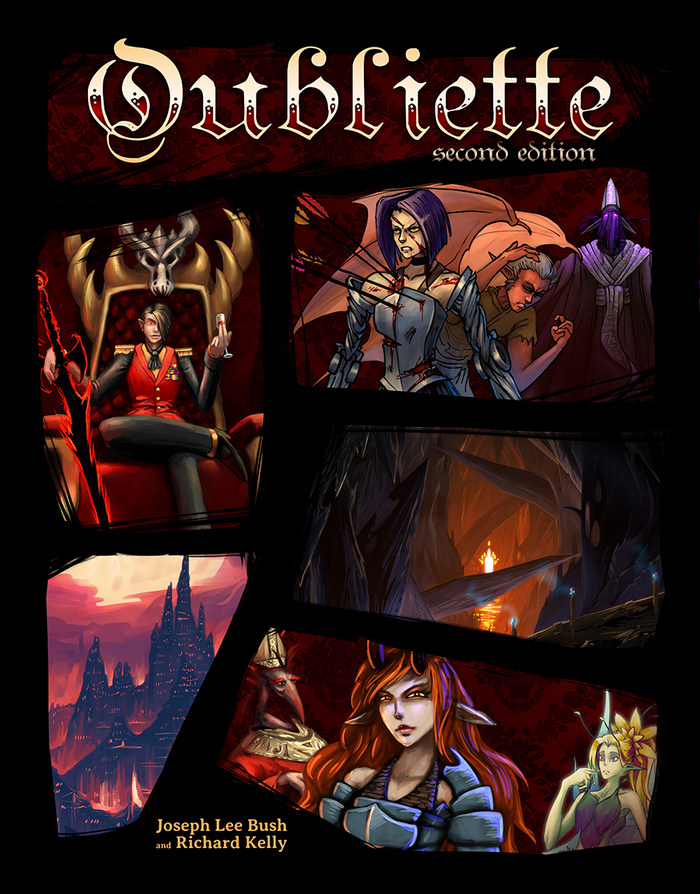
Oubliette: A dungeon only accessible by a trapdoor at the top. Derived from Middle French from oublier, “to forget”.
Oubliette is a newly released RPG by Joseph Lee Bush via Voidspiral Entertainment, using Evil Hat Publishing’s Fate Core system. It’s also my perfect RPG, hitting 99.9% of mY aEsThEtIc like nothing else I’ve ever seen.
First off: It uses a very minorly modified Fate Core as the engine, which is generally held to be a damn good game system, and its flexibility works wonders for this game, which is essentially an overflowing scrapyard of concepts. The system has minor tweaks, an expanded ladder and a mess of new skills, a new type of stress track, a rough “Level” system, etc. but is 90% Fate Core.
As such, most of the book is setting, gobs and gobs of shockingly good setting. The best way I could describe it is if you blended Planescape, Jim Henson’s Labyrinth, and Kill 6 Billion Demons, and Metroid together, then hit it with a thermonuclear war to get the kinks out. But, the best way to sell it is to show it. In the first post I’m just going to transpose the first page or so of text, with some of my own commentary in between. This is a pseudo in-universe fiction, and serves pretty well to wet the appetite and serves as an excellent start to the book.
§1 Awakening
Body of Light,
spirit of the Forgotten,
come to me.
Being of Matter,
be no more,
and rest here in forever.
(This book is full of quotes, so instead of using quote boxes for every one, italics will be used instead)
§1.1 Where am I? posted:
It’s an alley. Stone. Slick with muck up to the hip, and you’re laying in it, slipping and falling as you try and fail to stumble upright. Irrational—or perhaps delayed—terror courses momentarily through your veins, causing you to cower into the shadow of a mound of decaying garbage and rot, from which you recoil moments later. Every new sight is a surprise, a shock.
As you try to calm yourself, a woman appears in the rain, at the end of the alley. She is wiry, dark of eye and hair, and wears a motley of rags that are soaked through to her bones. She raises her hands, as though in surrender, or in an effort to show that she’s unarmed. You mumble at her, but the words come out wrong; parts are still missing.
“Raste tranquilli, amui,” she says, carefully entering the alley. She seems to be leaving it open so you can pass.
“What…”
“Ah, I see. Be calm, friend. You are in no danger.”
“What… what happened?”
“You died, I’m afraid. My condolences.”
“…Is this Hell?”
“Only if you make it so. Relax, I am a friend.”
“Where is this? What’s going on?” you ask, your mind whirling and your heart in your throat. It should already be too late to panic, but your brain is unconvinced by this reasoning.
“You’ve died. You’re dead. Gone from the World of Life. This is someplace else. This is Oubliette.”
“Oubliette?” you echo, trying to latch onto the
conversation to calm your unsteady nerves. She doesn’t seem so bad.
“Yes, Oubliette. Do you know what an oubliette is?” she asks, stepping into the alley further and out of the pounding rain of the street beyond. You try to ignore the hideous things stalking past in the rain.
“N-no… wait, it’s a dungeon, isn’t it?”
“Very good. Yes, this is Castle Oubliette, the dungeon at the end of the world. Welcome.”
Now to dig into this a bit: We know that Castle Oubliette is dirty and filthy, and somehow inherently terrifying and strange, but hey it has rain so that’s good. Presumably this world has at least semi-normal weather.
§1.2 How Did I Get Here? posted:
Approaching cautiously, she leads you further into the alley. She stops under an overhang of rotting wood, fabric, and leather from which dozens of glass jars hang, catching the rain. Faces peer over the edge and down at you from above, but they are shaped and colored wrong so you look away.
The woman wrings out her hood, sucking the rain from it and sighing, quenched. She waves to the green and brown creatures above, smiling at them. At your prompting, her attention returns to you.
“I suppose I should try to explain a little more, eh? Have a seat, you might faint,” she says, patting the muck next to her as she slides to the stones.
“This is Oubliette, where all things go when they are forgotten. Yes, even you. Now, brace yourself. A lot of this isn’t easy to hear.”
She adjusts herself, leaning toward you, to put her hand on your knee, as though to comfort you.
“You’re dead. Best to accept it now. This is the afterlife. And yes, it’s eternal. You’re stuck here. You’re just as eternal as everyone—and everything—else around here. You’re not going to Heaven or Hell, you’re probably not even going to leave this part of the Castle for quite a while. It usually takes some time to get used to the place. If you’re from Earth, you’re likely to see a lot of things here that you’ve never heard of or never believed could be real. And for good reason, all the different creatures and magics—well, nevermind all that. You’ll get the idea.”
The woman’s eyes flash and her hand lashes out like a lightning strike, then returns with an arthropod the size of both fsts put together. Her eyes are alight with glee.
“Ooh, aren’t you a big one. Oh, apologies. You’ll get hungry soon, and finding food will probably be the first thing you need to do. This is an edipede. Good steamed or stewed, but you can eat them raw if you need. Want to try it?”
She smiles. “I thought not. But you will soon enough. Anyway, you’re what we call a ‘newcomer,’ which means you’ve only just arrived. And you’ll be here quite a while. You’re immortal, now, after all. I know, I know. Hard to believe. But you’ll believe just fine after you wake up from your first death.”
So, from what we can read between the lines here, water and food are both rare and precious. You don’t put out random jars to catch rainwater if you live somewhere with indoor plumbing and bottled water. And well, since eating random giant bugs you grab in an ally is seemingly a normal thing to do there probably isn’t a Whole Foods down the block.
§1.3 Aren’t I Immortal? posted:
“My apologies, that was cruel of me. Few people believe when they first arrive. But it’s important for you to understand that, deep in your heart, because if you don’t you might end up Broken.”
She points down the alley, where a pile of bodies lies in the rain. You stifle a flinch when you realize they’re not dead, just unable to move. “They're Broken. Their minds are gone, shattered, and they’re likely to sit there for eons before that changes. So keep your wits about you, you’ll need them. Just because you come back from dying doesn’t make it pleasant. Those poor souls probably suffered one too many deaths, and now their minds are wrecked. Don’t let yourself become like them. Folk like you and me, still up walking around with our minds intact, we’re called Unbroken. Best to stay this way, if you ask me.”
She cracks open the stubby edipede and scoops out the
colorful insides, shoveling them into her mouth. Up close, you notice that she has an assortment of charms and wands hanging from her belt, none of which are familiar. They look very old.
“Oubliette isn’t a kind place. Unless you’re quite strong, you may want to lay low for a while, so you can get the lay of the land. A strange place it is, and you’re going to see a lot of things you never thought possible. And, well, chances are, you’re here because you’ve got a little spark of the unusual in you too. If you nurture that, you may just make it here.”
The woman finishes her edipede and looks out at the dwindling rain. After a moment she carefully unwraps the age-spotted bundle she’d been carrying on her back to reveal a large tome.
“Here. Take this. It’s… a guide of sorts. Someday, when you’ve no need for it any longer, you’ll meet a newcomer in an alley, they’ll be lost and terrified, but hopefully the book will help.”
She stands and flaps her uselessly sodden clothes, stepping lightly back out into to the rain as you open the strange book. It’s filled with cramped text, illustrations, pressed leaves, specimens, and charts. There are even, on the first few pages, these very words.
Your eyes widen as the book tells you what the woman is going to say next.
“My name is Lucette de Ardes. I’ll be seeing you around, newcomer.”
Hm, if you’ve played Eclipse Phase this might feel familiar to you. If we’re functionally immortal, it makes sense that the biggest threat is to our precious sanity. Unbroken is also the general name for PCs in this game, for future reference. Also, hints at how the skill system is… unique in this game. Namely: Everyone is a wizard. Everyone. Oh, and we’ll be learning more about Lucette later, when we get to learning about the denizens of Oubliette.
§1.4 What’s It About?
This next section is actually something I wish more games had: A list of themes that the game is based upon so you know what the designer was wanting to invoke and what sort of games you can run in it. These are split into three categories: Core Themes, Meta Themes, and Direction Themes.
Core themes are the bedrock of the game, and are present throughout the book and should form the basis of any campaign. They are:
- The Effects of Eternity
- The Determination of the Unbroken
- Staggering Immensity of Scale
- Effective Immortality
Meta themes are the basis of Oubliette as a game, and act as more design goals and GM guidelines than setting elements.
- All Myths Are True
- Drama and action are better than literalism and accuracy
- Life is Hard, but not depressing
- Death isn’t the same
- Players have goals
- It isn’t about whether you live or die, but how you do so
- Collaboration over competition
Finally Direction themes, which aren’t universal. Some games focus on all of them, or pick a few, or even one, but they run throughout the book and act as a good conceptual level for campaigns.
- Cosmic Fantasy
- Exploration of Strange Places
- General Weirdness
- The Fantasy Blues
- The Struggle For Survival
- The Vertigo of Immortality
- The Horror of Certainty
- Physical Transformation
- Nonhuman Characters
- Empathic Horror
- The Religions of New and Old Gods
- City of Spies
- Black Humor
§§1.5-1.8
This bit’s the general introduction sections. What materials you need, lets you know how the book is set up but with a hyperlink/page reference if you want to skip to Character Creation, the quick overview of Fate Core to give you some idea of what some key terminology means up front, and hilariously enough §1.8.1 is “A Note for D&D Players” explicitly going over the differences between Oubliette/Fate Core and your typical dungeon crawling D&D game. It’s totally devoid of badwrongfun, and is mostly about explaining how different cognitive modes are needed to play this than D&D. It’s nice to see though.
That wraps §1 up, next time we get into §2 and jump face first into a bottomless chasm of really well written setting lore.
§2 Oubliette’s Life Eternal
Original SA post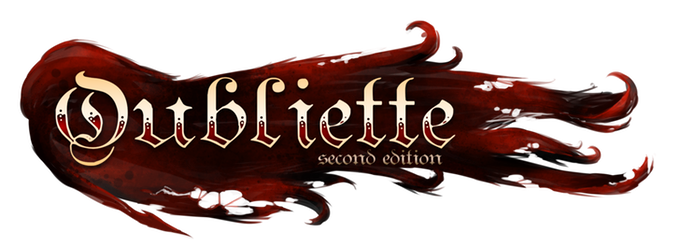
§2 Oubliette’s Life Eternal
I live for one thing. It is something fleeting, something obscure,
and I am the only one who even knows of it. If not for my
light, my muse, I would be long since Broken.
She is beautiful beyond words, slinking from a dirty hole
in the wall of luto viam, across the street, and into the tiny
bakery two stair flights above the murky streets. She does it
every morning, and for just those few minutes, I am at peace.
Everything else is weariness and grime and discomfort. So
important are these glimpses of hope that I have ensconced
myself on the roof of a building not far away, my feet and
hands melding into the stone, immobile for decades.
It is her devotion, perhaps, that is so heartbreakingly lovely
about her. Not a day goes by that she does not tend the store.
No weekends, no respite. She is never ill, never even tired.
She is the dawn, the perpetual sun rising on my grim world.
Except for today.
Today she isn’t there.
—Sindorstone the Gargoyle
Oubliette is not the World of Life, not where we come from. Everything is very very different, even basic truths of nature and reality we take for granted do not exist. This is where the baffling, the strange, the unusual, the macabre, and the occult go when they stop existing, when they are forgotten, when they pass away. Oubliette is a city built on the strange, the bizarre, the impossible.
Oubliette is also old, ancient beyond belief, and nothing here passes, nothing is ever really destroyed, and so everything is endlessly scavenged, salvaged, rebuilt, renewed, and recycled. Buildings in Oubliette are built on more buildings, a paving stone could have been the lintel over a fireplace, the cornerstone of a fortress, a trebuchet’s ammunition, the idol of a barbarian tribe, and a dragon’s kneecap over the millennia.
Life in Castle Oubliette is hard, dangerous, wild, insane, confusing, and forever. No death, no escape, except into madness and catatonia. Any newcomer is going to need a lot of help surviving: And that’s why this section exists. To give you a cliff’s notes to the Afterlife, and get your head into the right place before something bites it off.
§2.1 The Key Truths posted:
There are several important axioms that newcomers must
come to grips with before they can even begin to adapt to
life in Oubliette.
- You are Immortal.
You will not remain dead, even if killed.
- The Mind is Fragile.
Staying sane is harder than staying alive.
- Dying Hurts.
It is better not to die, both for mind and body.
- Life is Motion.
Stagnation leads to senescence and Breaking.
- Power is Structure.
Caste binds and separates us.
§2.1.1 The Breaking
The Truth “Life is Motion” isn’t literal. You aren’t going to die from settling down for the night (depending on the spot in question). Instead it means that to keep from Breaking, from losing all hope and spending the rest of eternity as a near-zombie, an ennui paralyzed wreck wasting away in the gutter, is to do things. In Oubliette you have to find something to do, some goal to strive for, some ideal to uphold, or your mind will shatter beneath the weight of time and death.
§2.1.2 Reproduction
There isn’t any. It’s thought that some of the “native” creatures of the Oubliette such as edipedes may actually breed but there’s never been any evidence found. Oh all the mechanics still work of course, and the urges are still there, but nothing results. Because of this there is no such thing as children in Oubliette. Oh you may find people that look like children, but they certainly don’t think like them. The World of the Forgotten makes people grow up real fast. There are some exceptions though: Plants and fungi can reproduce, creating fruits and seeds, without issue, meaning plants can be raised and farmed with arable soil being the biggest limitation for food production. Animals also can produce the side-effects of reproduction, just without birth. Cows can be induced to produce milk, chickens still lay eggs, etc. Therefore cattle, chickens, and other animals that produce food besides their own flesh are incredibly valuable and carefully guarded by their owners.
§2.2 Survival
You can’t die in Oubliette, not permanently, and not even from neglect. The only thing that can kill your body is trauma, violence, being beaten and slashed and crushed and torn apart. But you still need to eat, drink, sleep. You still need to stay warm and keep cool. You still need friends, allies, socialization. You need them. To ignore the body, mind, and soul is a short track to Breaking.
§2.2.1 Food & Water
As mentioned: You want to get food and water. See, you won’t die from starvation or dehydration, but all those lovely physical effects will still happen. You still get thirsty and hungry. Go long enough and you start wasting way, your body consuming itself, withering into a catatonic skeletal waste.
Fortunately there is food in Oubliette! Unfortunately most of what would be considered “good” is jealously guarded, and your average know-nothing newcomer isn’t going to have the cash, or reputation, to get a decent meal, unless you want to raid one of the many heavily guarded farms and gardens about the city. But then you’ll probably die.
So, in that case most newcomers, and lower caste denizens, make most of their meals out of the “Three Staples" : eyeweed, spongemeat, and edipedes. They are all exactly as gross as they sound! But they’re common enough, and nutritious enough, to keep you from Breaking or wasting away.
First up is eyeweed! It looks like a woody vine that grows in garbage, sludge, dirt, sewage, and various other refuse. Oh, and it has human-like eyeballs growing from it on stalks! Helpfully the whole plant is edible. The roots taste like raw sewage, and the stems like wood pulp, and the eyeballs are bitter, and pop when you bite them. But at least they’re nutritious! Spongemeat is a type of fungus that looks like muscle fiber. Ew. It grows on moist stone and absorbs nutrients from rain, dirt, dust, etc. Polite policy is to leave some behind after scraping it off the wall to continue growing, for others to “enjoy”. Spongemeat is described as pungent, like strong cheese though, and can be quite complex depending on where it grows. You can eat it raw, but often it is boiled or dried. Finally edipedes are hand-sized arthropods, looking a bit like large pillbugs. Edipedes are actually fairly popular food, as they are easy to raise, can taste different depending on their diets, and can be cooked and served in any number of ways.
Water can also be hard to come by. If you're lucky, you can capture rainwater to store, but most low-caste people have to make do with “free” water, found in gutters, cisterns, potholes, and tarpaulins. Until your stomach gets used to it though, expect to get sick for a while whenever to get a drink.
It’s important to remember that as you get richer, or more powerful, you can afford better food and easier access to clean water. In the classier parts there are taverns, bars, restaurants, and inns that serve quality dishes, and the elite of society can afford personal chefs and private larders.
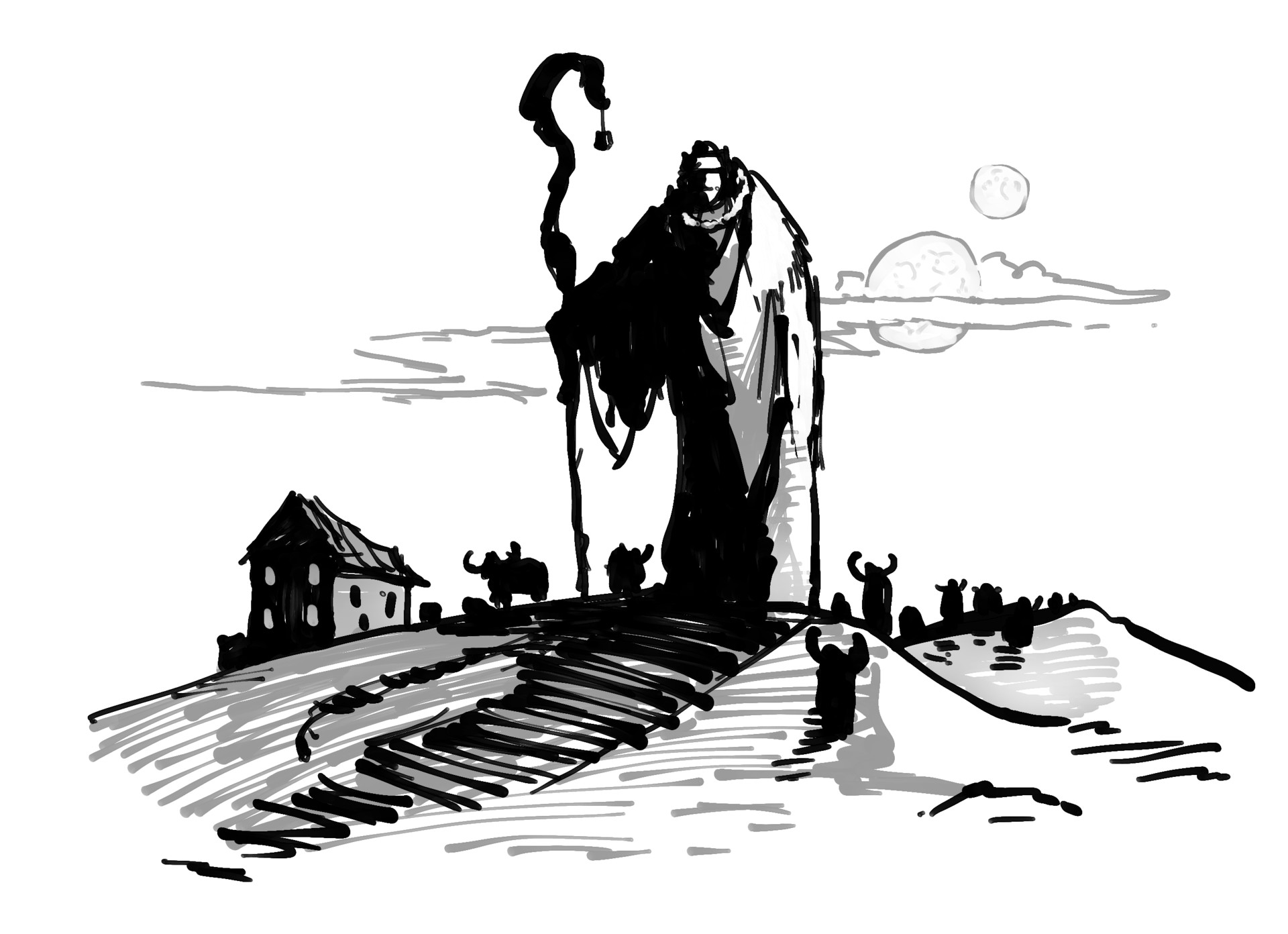
§2.2.2 Shelter
Finding shelter is actually pretty easy in Oubliette! Finding comfort is another matter. Even the lowest of the dregs can find a nice hole in the wall, or open sewer, or pile of debris to snuggle in when it gets cold and rainy. But, if you want something that doesn’t make you feel like a wild animal, you either need to scrape up some money or start social climbing. Joining a gang, or getting in with one of the many factions in the city is a good start. Most residents of the lower castes live in big ramshackle slums spread throughout the inner city.
§2.2.3 Materials
Damn near everything in Oubliette is recycled, and has been recycled for tens of thousands of years. Trees are scarce, and mining works very differently from how it does in the World of Life, so salvage and reuse is the rule of thumb. Entire professions and cultures have rose up around deconstruction, reconstruction, scavenging, and improvisational construction. Most newcomers have a hard time dealing with this, as the city seems nearly barren of useful material for those not able to see with the proper eyes.
§2.2.4 Money and Barter
Oubliette doesn’t really have anything like a unified currency. Anything can be bought and sold in Oubliette, somewhere, if you have the connections and the knowhow to find the right place. Commerce uses a mixture of barter, coin, trade, bills, credit, futures, stocks, bonds, favors, debts, contracts, promises, and threats. Pretty much anyone will take any currency offered though, because they know someone somewhere will take it in turn.
§2.2.5 Companionship
In short: Join a Group. While the city, particularly the interior districts, are packed with people they aren’t going to give you the time of day. They’re wrapped up in their own issues, or their own subcultures, and experience teaches that getting involved in stuff that isn’t your business is a bad idea for most denizens of Oubliette. So, join a group. Join a street gang, get involved in a neighborhood militia, make some trading contacts, get involved in one of the major factions of the city, join a cult, get infected by a symbiotic fungal growth, become a terrorist, anything! Why? Well, first off, having someone in the city that actually gives a shit about you really extends your reincarnation intervals. It makes it easier to get food, water, shelter, and the luxuries that make life worth living. It gives you something to care about and work towards which is the best way to keep from Breaking. It’s important, and it means that parties have a legit reason to form and stick together: The world is hostile and uncaring and your party members really genuinely are important to keeping you sane and whole.
§2.2.6 Entertainment
Not much to this section, just that there’s fun stuff to do as well. Sports, competitions, hobbies, parties, etc. Edipede racing, eyeweed plinking, bladebird counting, etc. Some areas have their own unique sports as well. Grandhall has lots of amateur climbers, Spearfield is full of parties and dances and balls, and gambling is a big pastime in Cutting. There are also waves and fads of games, hobbies, sports, etc. that come and go.
And that wraps up the first few bits of §2, starting with §2.3 we’ll start getting into more concrete information about the setting, and some possible explanations for what Castle Oubliette even is.
§2.3 Getting Along With Others
Original SA post
§2.3 Getting Along With Others
Let’s learn some useful hints about how to get along with our fellow sapient denizens of this eternal prison dimension! Cause if you don’t learn this then your brain is going to run out of your ears eventually after you get turbo-murdered or go bonkers from seeing a spider the size of a blue whale in the sky every day.
§2.3.1 Vulgish, Languages, and Dialects
Most people in Oubliette speak “Vulgish” a language unique to the city which is somewhat based on Latin, but with elements of French, German, English, ancient Saxon, Italian, Arabic, Hebrew, and loanwords from everywhere else imaginable. Most speakers have a colloquial dialect or creole based upon where they come from, and it’s reliably easy to pinpoint where someone lives based on their “accent”. Vulgish is mutually intelligible regardless of the dialect, and most can also speak some rough smattering of Vugish’s component languages. Some groups speak other languages as well: The Draculeans use Old-French, the Koom their native language of Rhol, many different goblinoid tongues, and the fae just speak whatever they want and seem to enjoy making up new languages for fun.
§2.3.2 People, Creatures, and Civilization
In short: Don’t judge by appearances. There’s lots of folk in Oubliette, and not all of them are human. Or humanoid. Every thinking being is made of the same basic soul-stuff, and over the eons beings can change radically in nature and form. You can’t look at someone or something and make any sort of assumptions about what they are, what they were, or what they will be. Gods may become beggars, and vice versa.
Lots of humanoids, particularly those who live in the Interior, have a nasty habit of falling into confirmation bias as to the nature of sentience. They start assuming humanoids are civilized, and anything else is an animal. But, just because something has fangs, and armored carapace, and feasts on human flesh doesn’t mean they can’t carry a conversation. In Oubliette even horrible drooling abominations can be engaged in pleasant conversation and maybe you can make a new friend with something twice your size that breathes fire and is made out of concrete.
Mind that if you aren’t humanoid yourself, some of the more mundane types might assume you’re a monster on first sight, so if you find yourself with a few extra limbs and an armored carapace maybe avoid the calmer districts if you don’t want the torches and pitchforks to come out.
§§2.2.3 & 2.3.4 Finding Companions & Joining Factions
One’s first priority should be to learn enough Vulgish to be able to talk to people, which should be fairly quick. Most Vulgish speakers can understand at least some of any other language, so you’ve got not far to go to be able to carry an at least rough conversation. Then, find somewhere to belong. This often involves going out and exploring the castle to find your place in the world, and it may take decades to do, but it’s time well spent.
Then once you’ve gotten a life and social situation sorted, you might look to join one of the major factions of the Castle. Or if you’ve got some gumption. Or if you’re unique and interesting enough, they may find you. Some factions are fairly open to membership, others are extremely selective, and some are functionally impossible to join.
Some of the factions newcomers will most likely run into are the Draculeans, especially in Spearfield, the Guild in Grandhall, the Thorns because good luck avoid them, and the Feeders who are always a welcome sight to the poor and downtrodden. If you’re really lucky you’ll even run into the New World, which is the best start you can get in the World of the Forgotten.
As for people who get snapped up by the factions proactively, High-blooded Vampires are always “invited” into the Draculeans. Saints, Crusaders, and other prominent religious figures are fought over b y the Thorns and Ordo Sancti. If you know your magic then the Magi and Transcendence Club will seek you out, and there are other racial, social, or talent based qualifications that will put you on a short list for membership with some power-group.
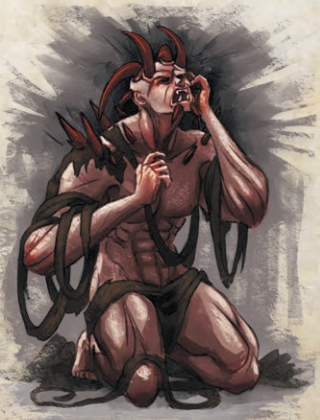
§2.3.5 Views on Castle Oubliette
So, what the hell is this place anyway? It’s known that the World of the Forgotten is the Afterlife. Or an Afterlife. At least it’s generally assumed it is. Probably? The fact is, if someone does know what’s actually going on they aren’t telling, so there’s lots of competing theories about just what the hell Castle Oubliette and the World of the Forgotten actually are.
- Hell
It’s HELL! Or Hells. Or some combination of all the “Hells” of many religions put together. People point to the existence of the Undead, to the fact there’s no trace of any sort of God or real ruling power, the presence of monsters and what seem to be legit literal demons, and the whole reincarnation thing that seems perfect for eternal punishment. It doesn’t help that some parts of the castle look straight out of a Hieronymus Bosch.
- Heaven
Nope, obviously heaven. It’s known that there are Angels, or things shockingly like them, in the city. People do in fact live forever. You can become, eventually, anything you want. You can make or find anything you can wish for as well. Honestly, most of the bad stuff comes from your fellow beings, and if people just got along the place could easily be a paradise. If Oubliette is Hell, says this camp, then it’s a really shit one.
- Purgatory
Some hold that Oubliette is a waiting room, a stopping place before going on to the legit actual afterlife. A place to separate the wheat from the chaff, and a second chance to find redemption. Or, more disturbingly, the afterlife for people who are neither good enough or evil enough to go to heaven or hell, a prison for the spiritually mediocre.
- The Pagan Beyond
Held by people and beings who either don’t adhere to the Abrahamic faiths or are older than their spread, this posits the World of the Forgotten is just the Afterlife, Underworld, Hades, etc, the singular afterlife found in many polytheistic religions, or at least a part of it. This theory is hard to refute, but as it offers no actual explanation most see it as kind of unsatisfactory.
- The Abrahamic Something Else
Maybe it’s outside of creation, the “Outer Darkness”, or the non-creation of primal chaos, or the rough draft of a new creation, or the remnants of a far future post-Revelation Earth, or some other thing yanked out of the reams of Christian, Jewish, and Muslim apocrypha and scripture.
- The Insane God
Essentially the Gnostic view. Oubliette is obviously a product of God or the Creator or the Demiurge or whatever going nutso and Heaven and Hell getting all mashed up together into a chaotic madhouse. Nothing makes sense and everything’s weird because the World of the Forgotten is the twisted product of the diseased mind of a mad divinity.
- The Dead God
God is Dead! Castle Oubliette is the Afterlife devoid of God, as creation crumbles and mixes like dust in the wind. Everything’s mixed up and shit because no one's there running things anymore and we’re just waiting to dissolve into entropy and chaos. Popular among the completely nihilistically depressed and the utterly hopeless. Not very popular a belief for obvious reasons.
- The Un-God
Oubliette is a maddened torture prison created by some cosmic embodiment of total evil and depravity, the dark mirror of creation made by an evil, or insane, or idiotic being equal to God. If God is Omnibenevolent, Omniscient, and Omnipotent then whoever made Oubliette was Omnimalevolent, Omni-Ignorant, and Omni-Impotent.
- Fae Land
The Otherworld, Land of the Fae, invaded my Mundane people who fell through the cracks of reality into this Wonderland. Faeries are here, and magic and wonder! This is a belief held only by those who are not and do not deal with the Fae, and don’t really know how they work within Oubliette.
- Over the Edge
The baffling belief that the world is flat, and Oubliette is on the flipside of Earth. While the World of the Forgotten is apparently actually flat, there is a sun that crosses the sky daily, and most people who know for a fact Earth is y’know… spherical dismiss this out of hand.
- Atlantis
The remnant ruins of Atlantis that was sucked into a pocket dimension! Dimensional space-rifts! It’s on the inside of the Hollow Earth! SPACE ALIENS! Insert wackadoo New Age-y belief here about Vril energies and lost civilizations.
- Solipsism
The Castle is actually all a dream within the imagination of an autistic boy who really likes snow globes. In essence, these people think everything is imaginary and they’re pulling an Occurence at Owl Creek Bridge, or are in a coma, or have some sort of turbo-schizophrenia. This generally gets these people in trouble with others who assert they do, in fact, exist.
Next time, §§2.4 and 2.5, which covers the natural laws of Oubliette, biology, time, and space.
§2.4 Physical Forms
Original SA post
§2.4 Physical Forms
Denizens of the castle no longer really adhere to the… regular laws of biology. Form is inherently mutable and changing, and everyone in Oubliette changes over time.
§2.4.1 Age
Physical age is mutable, and people can seemingly age and regress and age again. Someone who’s a thousand years old can look like a teenager, while someone who’s only thirty can look like an octogenarian. Physical age is strongly based on mental state and personality of the individual, and has nothing to do with time.
§2.4.2 Strange Races
Castle Oubliette is by its very nature home of the strange, eldritch, arcane, cryptic and mystic. Huge portions of the population are made up of races and species alien to normal human experience. Some of them are familiar: Goblins, elves, ogres, they are still remembered in some way in living memory, but noone of the World of Life remembers the Koom, the Preen, the Mongers and Hornfolk and Grist. It’s a bit of a shock for newcomers. Most people who’ve been in Oubliette for a while stop caring though. Most people don’t judgy by physical form overmuch, unless whatever it is is strange enough you can’t tell if it’s friend or foe, or even sentient.
§2.4.3 Mutations
Mutations among the populace of Oubliette are nearly universal, with inhabitants shifting and changing over time, deviating from their base stock far more than mere genetics would allow. Most mutations are a strange fusion of adaptation and training, bodies becoming better suited to whatever the being in question does. Bare-knuckle brawlers develop armored knuckles, professional politicians possess literally hypnotic voices, teamsters and manual laborers have inhumanly developed muscles specific to their job.
§2.4.4 Unique Beings
Oubliette is also home to singular entities, members of no species or race, not the product of mutation, but purely unique things. Most generally fit into some role in the Castle, finding a niche and getting along as best they can.
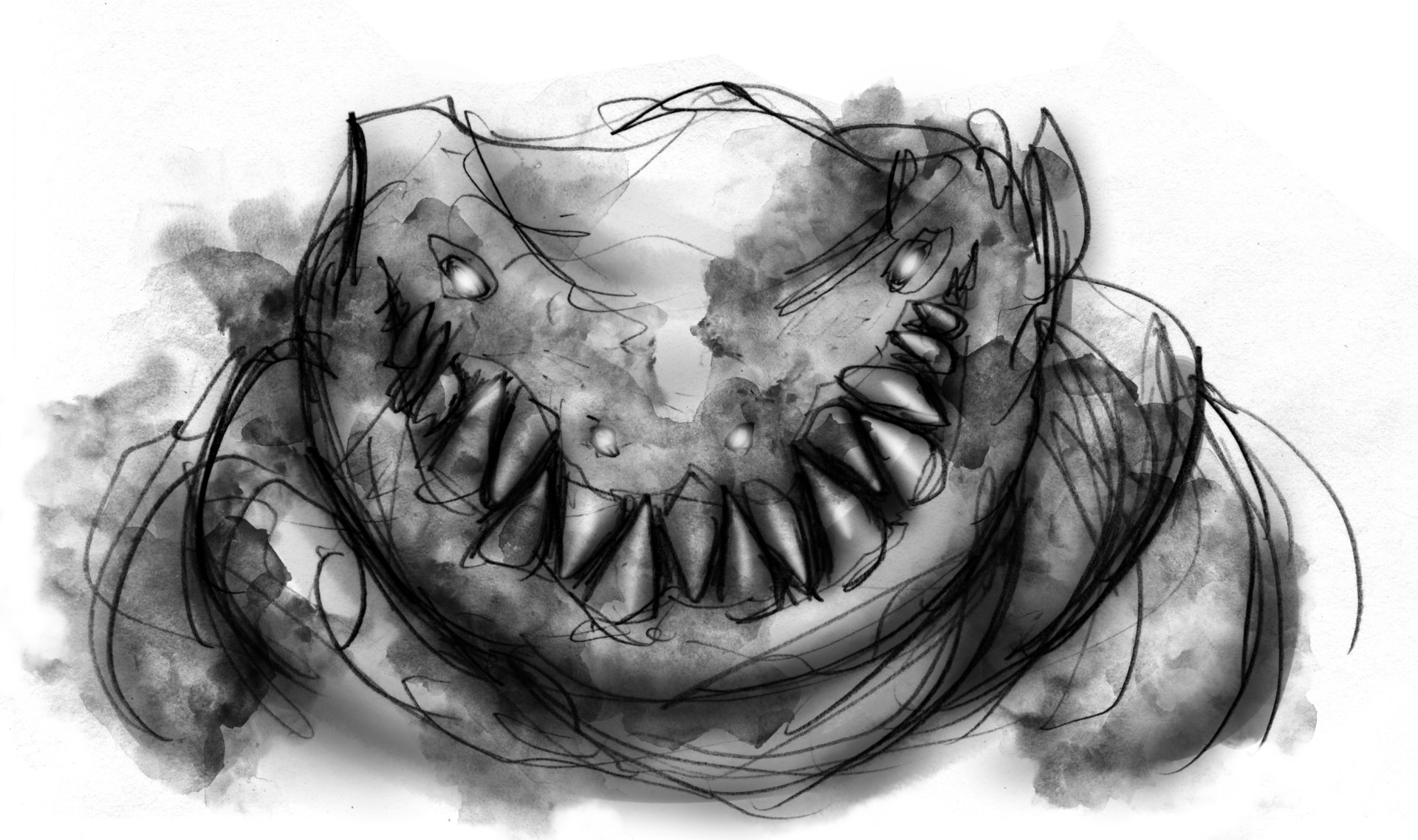
§2.5 Time and Space
Time is like a ball of string, and space like a giant ever expanding sponge. Time and space, cause and effect are decidedly unnatural in Oubliette, though on the micro level it generally isn’t as apparent.
§2.5.1 Two Streams of Time
The World of the Forgotten and the World of Life are linked in time, but not in any linear or logical fashion. Imagine two strings, balled up and tangled together: While both can be followed from end to end they touch is very different places along their length. Events in the World of Life do not linearly link up with events in the World of the Forgotten. Beings from the far future of the World of Life arrive in the distant murky past of the Forgotten. People who all were pulled to Oubliette at the same time can arrive centuries apart and totally out of order. A single event in the World of Life can propagate and affect Oubliette for millennia.
§2.5.2 Timekeeping
Time is not meaningless in the Castle itself though: It progresses linearly much like in the World of Life and is counted in much the same way. While seasons don’t really exist, years are still counted as 365 days. Days themselves are based on the movement of the sun, and match close enough to Earthly 24 hour days to be workable. Clocks still must be routinely tuned though, as the sun seems to vary in its rate randomly over time making days and years only a rough approximation of true time.
AD/CE and BC/BCE don’t matter either, as there is a general lack of any sort of commonly agreed upon “base” for the calendar. Most people simply refer to Years Ago or Years From Now, counting back or forward from the present. There is a fixed Year Zero, used in the Old Reckoning calendar which is approximately 23,600 years from Oubliette’s “Present” but this method is mainly used by scholars for histories and academic texts. Some cultures mark time differently though Gloomhome uses a star-based calendar, denizens who live underground often track time by meals, and some goblin towns all live by a single, probably broken, timepiece regardless of its accuracy or consistency.
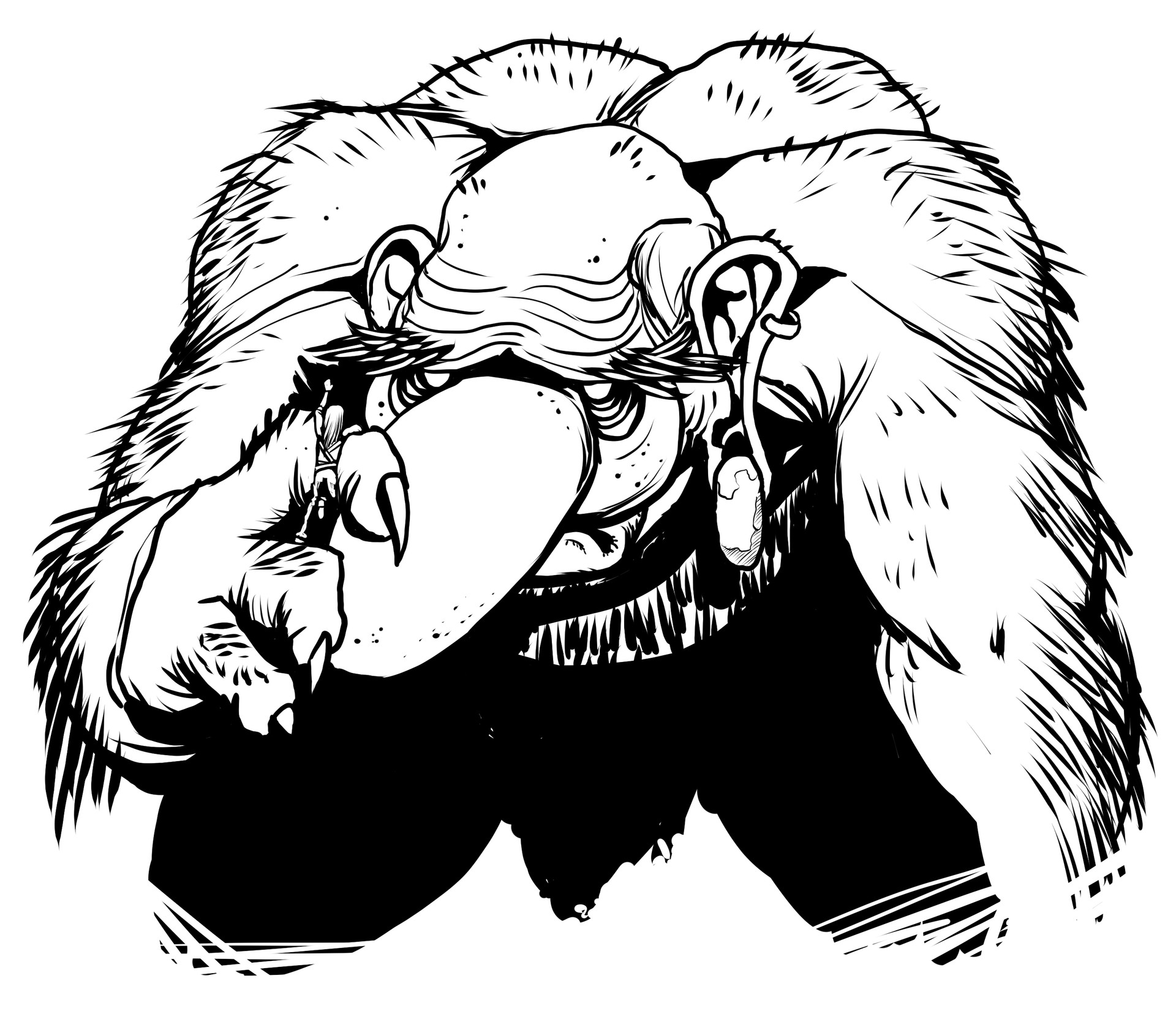
§2.5.3 Other Worlds Too
Oh, by the way: The World of Life technically incorporates an entire multiverse and alternate dimensions. Not everything in Oubliette came from our familiar Earth. Alternate Earths, or alternate dimensions, alien worlds and times, universes with completely alien laws of physics as well. For many of Oubliette’s residents the Castle is the only thing they have in common.
§2.5.4 Structure of the City
Castle Oubliette itself has two notable physical features that are present throughout the city. The first is that new arrivals are “sorted” throughout the city, appearing in the districts and regions that would best suite them. While occasionally there are mix-ups and misplacements the majority of beings in Oubliette consistently find themselves placed in the most hospitable environment the city has to offer.
The second is that the city is slowly growing over time. It’s known that the Castle wasn’t always the current size, which covers hundreds of miles, but seemingly grew from a smaller “original” building. Whether this building came from the World of Life or was always in existence is a debated topic.
§2.5.5 Death & Worse
You can’t die in Oubliette. While the exact rules for reincarnating are covered later, when you die your body remains where it is, but after a while your re-appear somewhere in the city in a brand new body just like your old one at time of death, minus wounds, starvation, etc. No-one has ever permanently died in Oubliette, at least not with definite confirmation. People disappear of course, but often they show up again eventually, and any permanent disappearances are either just rumor or have some other explanation.
As a side effect, death is not the worst thing possible anymore. Much more feared is anything short of it. Being trapped to slowly starve into madness, being tortured forever knowing that death is no escape, being crippled enough you don’t die, but can no longer kill yourself…
And that wraps up section 2! Next time Section 3, Denizens of Oubliette and a lot more interesting stuff. THe first two chapters are a bit dry because it’s an introductory bit, but now we’re getting into details and fun things, in this case Castes, Races, and Factions!
§3 Denizens of Oubliette
Original SA post
§3 Denizens of Oubliette
It’s easy to forget that Oubliette is home to more than just
fairy tales. If you hide long enough, you can almost convince
yourself that the place is inhabited by normal folk. Spend
enough time in Grandhall and you’ll forget what lies over the
Border.
I’m not talking about werewolves, vampires, and giants.
Those are the least of your worries. I’m talking about the
truly wicked things, the creatures that stalk the wastes below
Deathborne, the hideous lurkers in the forests of Fellmoor, the
mind-demons below Mubigild, the conceptually abhorrent
occupants of the darkness below everything.
Some of us came to Oubliette because we were forgotten. But
some of us—them, really—were not “forgotten” so much
as “exiled forcibly by the metaphysical laws of reality itself.”
Think about that. Beings live here that literally could not exist
elsewhere.
And they’re our neighbors.
Section three is all about the inhabitants of Oubliette, and is the first non-introductory chapter so we’ll be getting lots more detailed setting info. This chapter covers the caste system that defines the social strata of Oubliette, the most common sentient races in the city, and the various factions that make up the city. This is also where the heavy Planescape inspiration starts being really evident.
§3.1 Broken and Unbroken
Broken and Unbroken are the two overriding states of being in Oubliette, separating the sane and the active from the mad and catatonic.
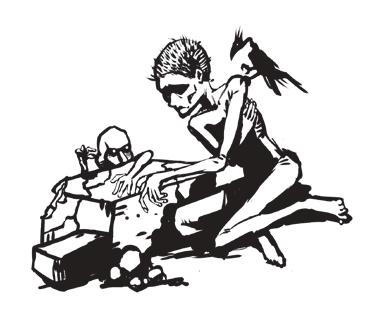
§3.1.1 The Broken
Look there. The gutters are full of nihilists,
cynics, misanthropes, and skeptics.
It’s likely that the majority of the inhabitants of Castle Oubliette are Broken. The sad fact is most mortal minds just can’t handle the stresses of immortality, and eventually their sanity either shatters or withers away. Most of the broken are a sort of listless mob, slowly wasting away while laying about in catatonia or wandering through the city seeking little more than to fulfill their base instincts. Some are more active, becoming mentally trapped, repeating the same action or job endlessly in a stupor. These sort, if their mania is constructive, are often captured and used as labor. Some rare Unbroken also turn feral and violent, attacking others like vicious animals.
Broken humanoids are often called “zombies”, though this is a slang term and not often used by those familiar with true Undead. Non-humanoids are often simply labeled as “monster”, and often are met with violence by the Unbroken. But, Broken can be “fixed”, and there are several organizations in the city who often attempt the rehabilitation of the Broken back into Unbroken. This is often done as a combination of welfare, particularly ensuring they get food and water, and therapy.
§§3.1.2, 3.1.3, 3.1.4 The Unbroken, Reasons for Living, and Walking the Line
What kind of person does it take to face eternity? Ironically,
the same that can face death.
The Unbroken are the active, sane population of Oubliette. While the Broken outnumber them, they are the living force of the city and drive everything that happens. The definition of an Unbroken is simple: Those still able to live a useful active life. Unbroken aren’t sane, many denizens of Oubliette can easily be seen as mad in their own way, but through sheer willpower they keep living instead of Breaking.
The way the Unbroken cope with infinity are many and varied. Some don’t think about the future at all just living in the moment all the time, others obsessively pursue some goal or task. Many just focus on living their daily lives, trying to recreate the sanity and safety of Life. Others just keep on through sheer bloody-minded determination, or through the fanatical dedication to a cause or ideal, or just by not giving a shit about it. A rare few accept Immortality, becoming comfortable with their long lives and reincarnations, or even considering Oubliette a relative paradise compared to the World of Life.
It’s also important to note that Broken and Unbroken aren’t exactly perfectly binary. There are many beings that walk a line between them, or seem to move between each state as their moods change, alternating between madness and sanity. While rare, these line-walkers show that things aren’t as clear cut as many think.
Okay, next time it’s the Castes of the Castle.
§3.2 Castes
Original SA post \
\§3.2 Castes
The Caste scale is a sort of in-universe equivalent of Levels in other games. It is a hierarchy of power and influence in the Castle, and all denizens are placed somewhere on this scale. It is important to note that Caste is fluid and does not define any particular role or nature. Beings can move up and down through the Castes as they gather power and influence, or as they stagnate and weaken.
§3.2.1 Refuse
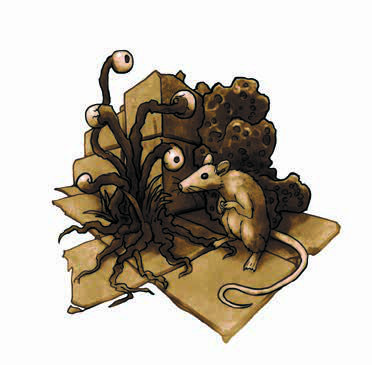
Once, after losing all my power, I spent a decade raising
snakeveg in Foyer. Easy work, but the tedium nearly Broke
me.
This Caste is the home of the lowest of the low, the weakest beings in Oubliette. Most things in this Caste are small non-sentient animals. Anything considered actually dangerous doesn’t belong here, this is the Caste of vermin and food. Refuse aren’t concerned with any high ideals, and spend their entire existence fighting for survival as the definitive bottom of the food chain. While some sentients do exist in this caste, they too are small, weak, and generally inconsequential.
§3.2.1 Dregs
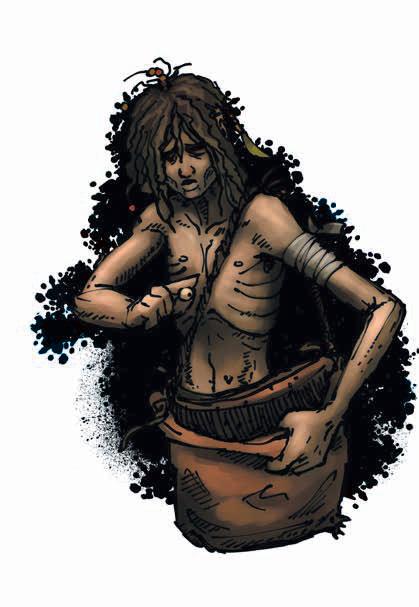
They keep us in pens, like the cattle the giants keep to the south. I don’t know where I
am. Or why I’m here. I don’t even know what my name is, it’s been so long since I used
it last.
All I know is that the pale men come every night to drink our blood, and there’s
nothing in the world we can do to stop them.
— #2820, Livestock Enclosure C
The Dregs are the Caste for the weakest humans, larger but non-agressive or dangerous beasts, and many of the smaller races such as Goblins and lesser Fae. The Dregs are the majority of the population of the Interior, and act as the manual labor force of the city. They pull carts, plow fields, clean, and do many forms of simple but grueling labor. Often dregs make a supplemental living by growing small plots of food, doing simple trading, and scavenging.
The main concern of the Dreg caste is food: most of a Dregs life is in pursuit of making sure that they can have enough food today to get enough food tomorrow to get enough food for the day after than, and so on. Material resources are basic, and luxuries are a rare thing to them.
The best comparison would be your typical medieval peasant dirt-farmer in other settings.
§3.2.3 Rabble
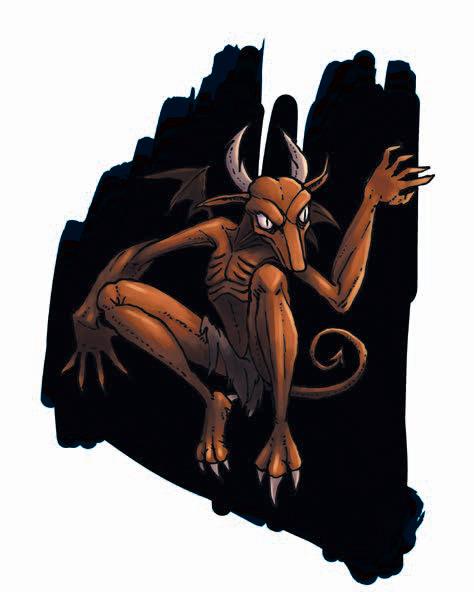
It came through in the night. Dragged off an ox. Third time this week. Now
when the night falls, we all sleep in the headman’s house.
—Folt, a Butcherblock scav
This is the lowest caste that most PCs would reasonably start in. Rabble are the “middle class” of the city, made up of skilled professionals, merchants, hostile but mundane animals, and the weaker of supernatural beings. Your average footsoldier, town guard, blacksmith, etc would fit here.
Rabble still work for food and necessities but they have enough power and influence to get them reliably, and have some luxuries on the side. Rabble often are in the positions of direct power over the Dregs.
§3.2.4 Lost
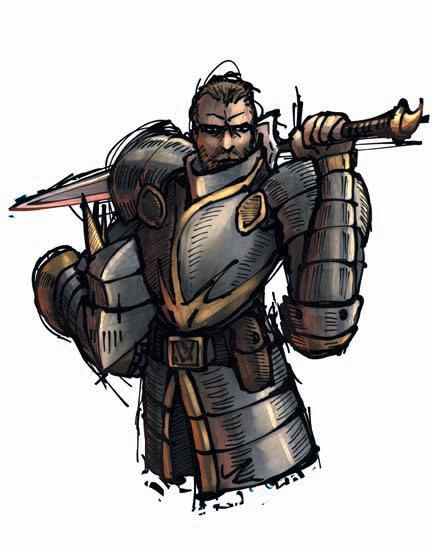
He strolled past the center of town, every inch of him
shining. The sun caught his armor and it hurt our eyes
to watch, but watch we did. It was not every day we got to meet
someone who had sworn to kill a dragon.
—A low-blood in Grandhall
The Lost are where you find the most powerful beings that could conceivably exist in the World of Life, and is the upper-tier of “mundane” beings. Heroes, master-warriors, supremely skilled professionals, dangerous animals, and the weaker forms of supernatural beings reside in this category. Lost are the highest Caste that the masses of Oubliette will encounter with any regularity.
Lost are mostly beyond worrying about daily necessities, and instead are the lowest caste where focusing on their own personal goals or ideals take up much of their time.
§3.2.5 Fallen
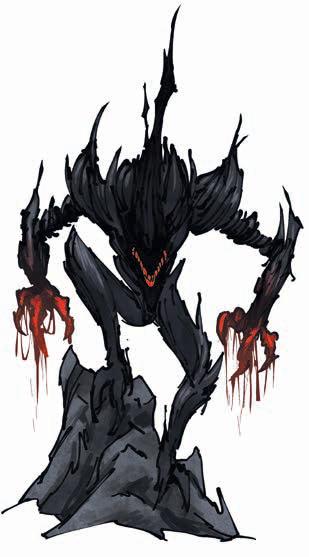
She leaves footprints that burn. You can see her sometimes from this ridge,
down where the slope meets the Murder Heat. Best not to approach,
however. She’s perfumed in sulfur and her kiss can melt steel.
—Lod, a goblin scout and hopeless romantic
This is the lowest Caste where you start seeing blatantly supernatural beings. This is where most of your traditional monsters, your trolls, Werethings, elementals, lesser dragons, etc reside. This is also where you start getting people with blatant magical or supernatural abilities beyond what is possible in the World of Life.
Fallen make up the bottom of the “middle rank” Castes, and so act as a sort of big fish in a small pond to the lesser Castes. To those below them Fallen are rare and storied and rarely encountered, but are in fact as the bottom of a whole new pecking order.
§3.2.6 Forsaken
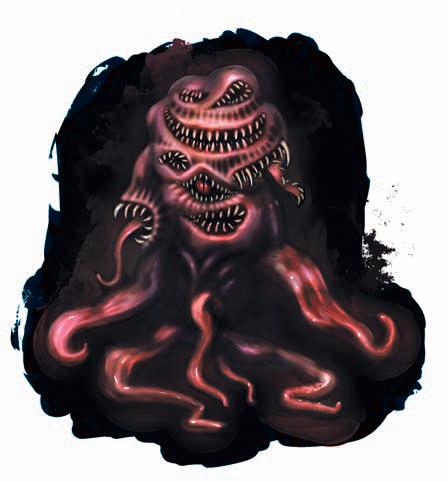
I’ve been bringing him drinks when I can. A sip of water carried fve
miles from the well. A waterskin left on a rock. Except when I
interrupt him, he just keeps digging. The quarry is a fathom deep
and his hands are broad, distended paddles, but this is what he has to
do, he tells me. Tunnel until he hits bottom.
The Forsaken Caste forms a sort of midpoint in the Caste rankings, creating a clear delineation between those below and those above. Forsaken are the highest beings that those of lower Caste will likely ever personally interact with, and achieving this caste is the start of getting to become a legitimate power-player in the Castle. This is the Caste of lesser-spirit, the weaker Dragonkin, personifications of abstract concepts, common Demons, true Magicians and the like.
Forsaken are driven by the desire for more power, more influence, and the furthering of their ideals or goals. To reach this caste and beyond passive accumulation of power and prestige is not enough, and from here on actively seeking to improve oneself or pursue some goal is necessary. Passivity breeds weakness.
§3.2.7 Eminent
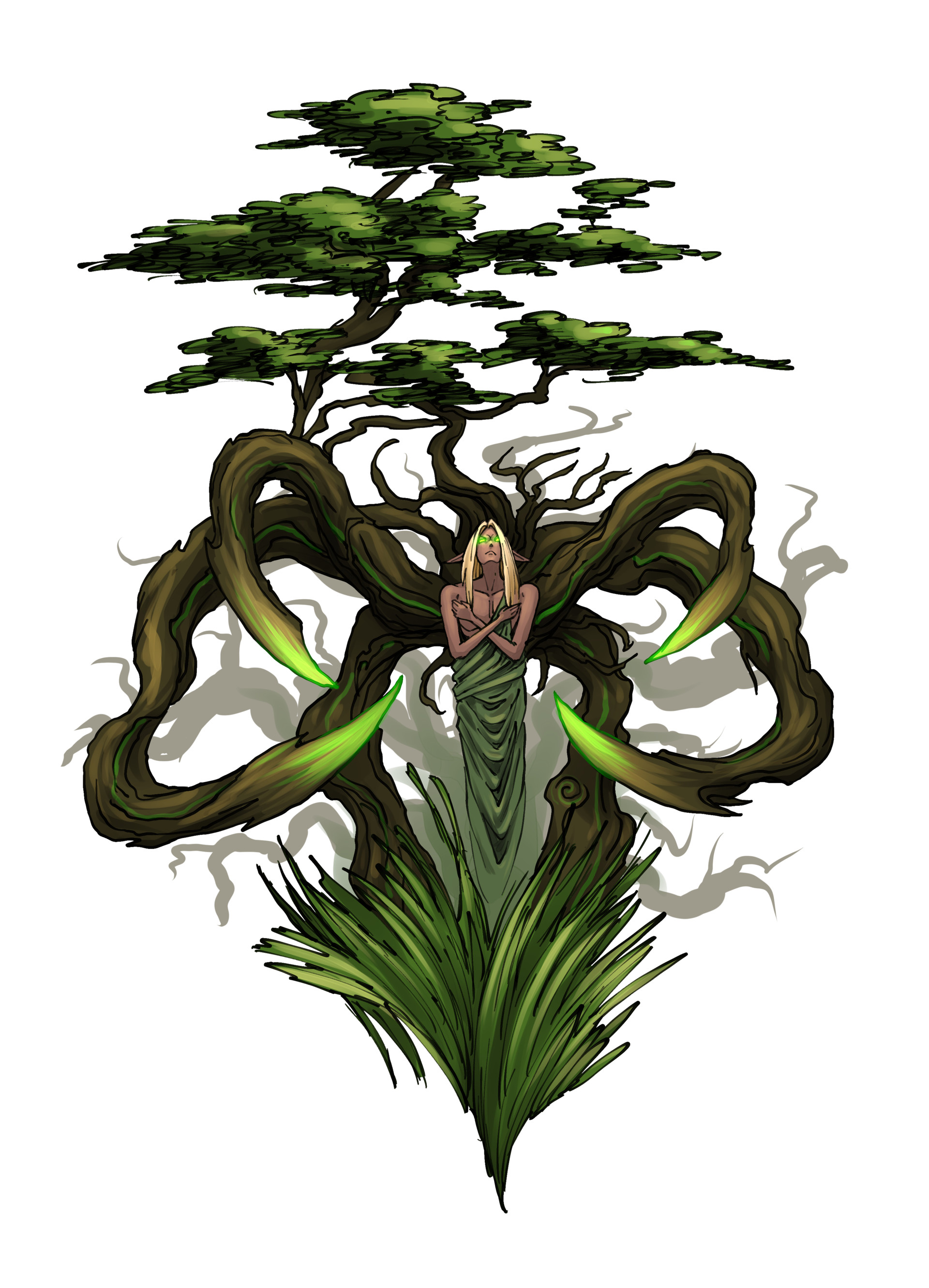
Staggering under its burden, the bird-lizard trudges. It
has been piled high with heaps of plate mail and kevlar,
chain-links and silk and what looks to be bottled mercury. A tattered
sign on its side proclaims deals for any merchant daring enough to
approach. Its talons are red, however, and I wonder who all that
armor used to belong to. When it swings its blood-shot, smiling
eyes at me, I no longer want to know.
The Eminent are where the true movers and shakers of the Castle start showing up. These are the top-tier of what the lower Caste can even conceive of existing. This is the domain of Archmagi, Vampire Lords, True Dragons, demi-gods, mythic heroes, and the like. Eminent Caste beings are the upper echelon of power in Oubliette, sort of the “nobility” of the City. They cannot rule unopposed but wield incredible and almost godlike power over those below them.
§3.2.8 Eldritch
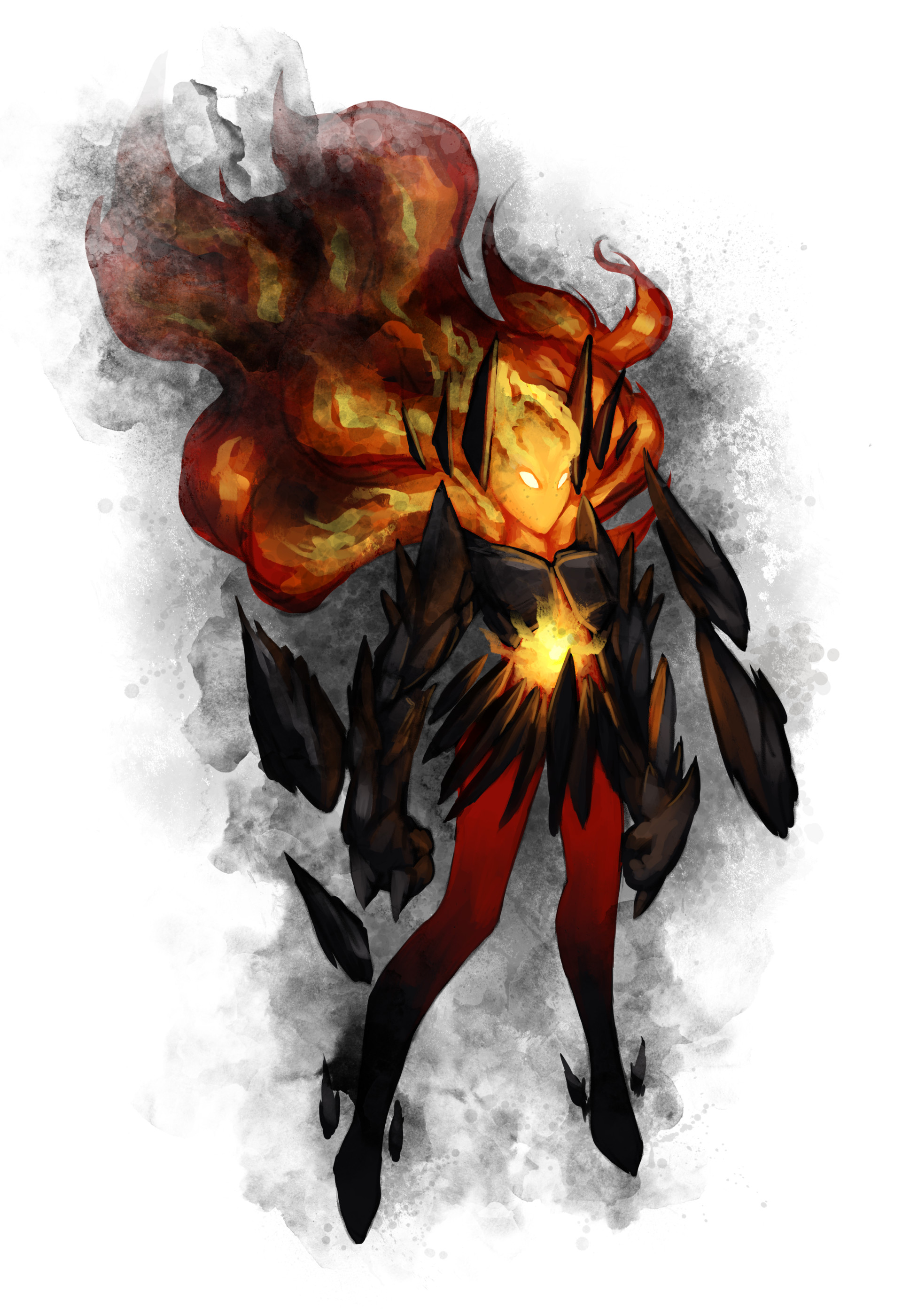
The harbinger of doom came to our court. Ours. Of all the
councils in Spearfield, Vlad visits ours the most. Terror
gripped us, as you can surely imagine, and while the most
brave of us spoke to this holy abomination, the strongest of
our knights crept around to bracket her from all sides.
I’m sure that Yvienne meant no harm, but it was her
words that set the thing off. In an instant it had torn
through the court, through the lords, through the
knights, and through the walls.
We were forced to abandon Toullers afer of
that. I’m sure they won’t forget. But I myself
took away something different. Ambition.
—Marie Gyul, supplicating to Linthara.
The Eldritch caste is the de-facto rulers of Castle Oubliette. Godlike beings, many faction leaders, greater elementals and living concepts, Archangels, and God-Kings reside in this caste. These beings fan eliminate entire armies of lesser foes without effort, and sit at the top of the “mundane” politics of the city. For the majority of beings in Oubliette, the Eldritch caste is the end of the line with only rare exceptions being above them.
§3.2.9 Ancient
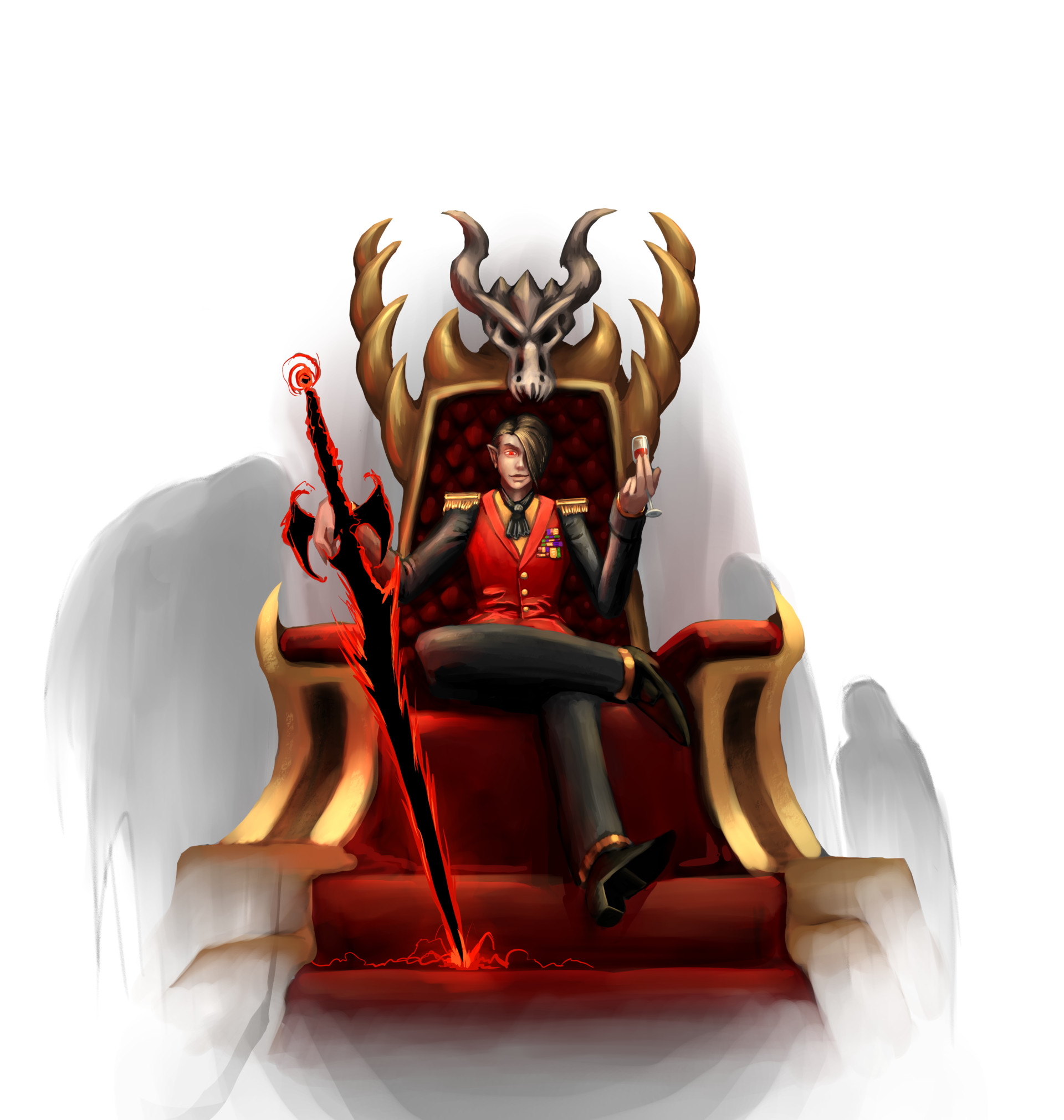
[/i]It’s not like it happens every Tuesday or anything, but you see
her up there from time to time. She’s called Nine Sky, or at
least that’s what I’ve heard. Yep, right up there, between the
towers of Celeste. It’s a crazy light show. Depending on who’s
throwing down, you can see her summon swarms of swords,
or just gigantic blades the size of skyscrapers.
Sometimes there’s earthquakes, sure. Occasionally the Wall
collapses and takes a few wards with it. Whatever. Best seats
in the house, if you ask me.
—Averow Stradlett, a Marauder from South Spearfield[/i]
The Ancients are the truly Godlike beings of the Castle, those so far above the petty politicking of their lessers that their maneuvering and influence are hidden, seeming to be the natural actions of the city. Ancient beings are things like Demon Lords, Vampire Kings, Dragon-Gods, Titans, and the like. These are the beings that know the true nature of reality and are privy to the deepest secrets of Castle Oubliette.
Most Ancients are disconnected from the day-to-day of the Castle though, being absorbed either in their own personal goals, or in the high-level politicking and infighting far beyond the concern and influence of their lessers.
§3.2.10 Divine
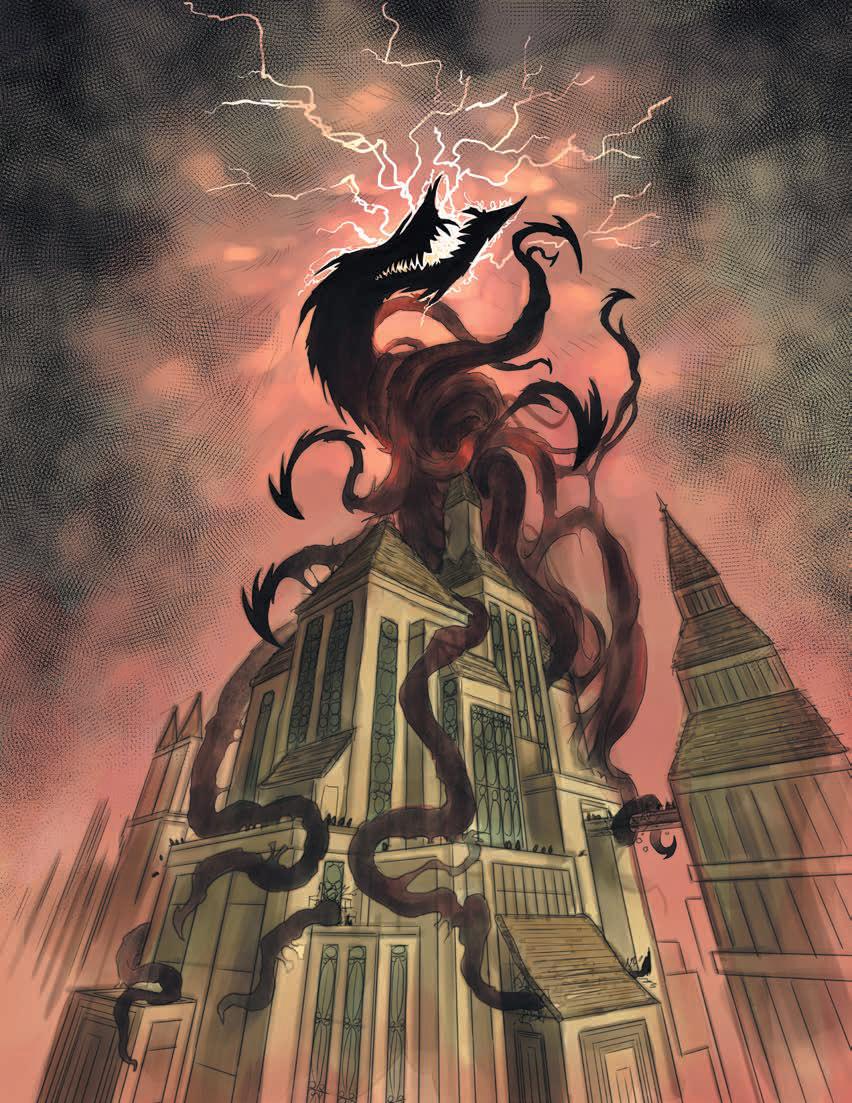
The King? Got bigger concerns than the Castle, I daresay.
There's a world beyond this, I’ve been told, although maybe
that’s all a pretext. If it’s true, I shudder to imagine what kind
of creatures could survive in the wilds beyond purgatory
The Divine Caste is made up of individuals, no category or group of beings exist at this level. These beings are ghost-like, a myth to the lower Castes at best, the invisible rulers of the Universe beyond even the Ancients ability to challenge. The Divine are concerned by matters far beyond the Castle itself, being concerned with cosmic issues that most beings are not even aware of, the equivalent of international conflicts of the afterlife.
And that’s it for the Castes! Now these may seem a bit vague at the moment, but Caste is essentially this game's equivalent of Levels, or if you’re familiar with the Dresden Files RPG the power-levels in that game. They have mechanical effects during character creation, and the differences will be more obvious when we get to going over NPCs and the Bestiary.
Next time though, the most common sentient Races of Oubliette!